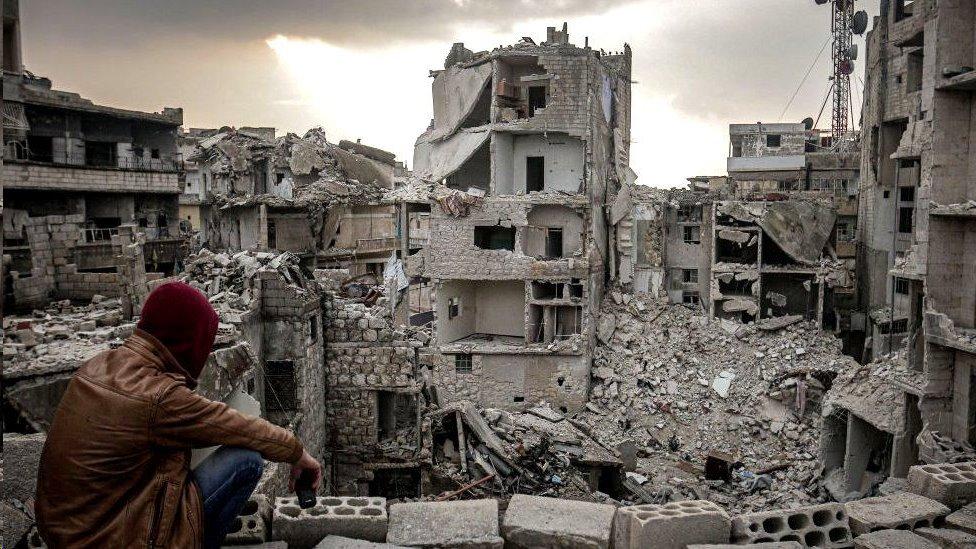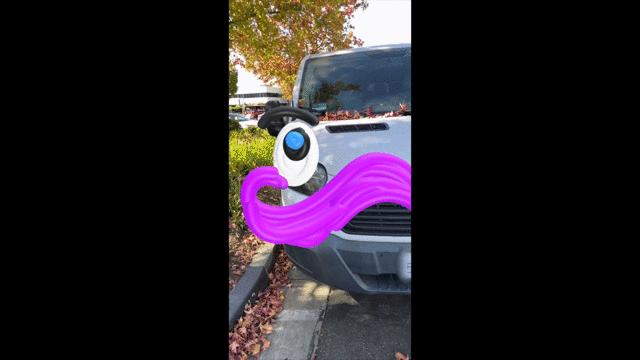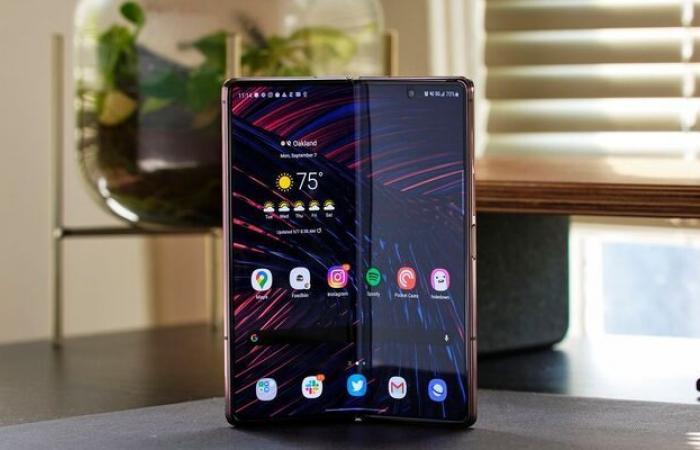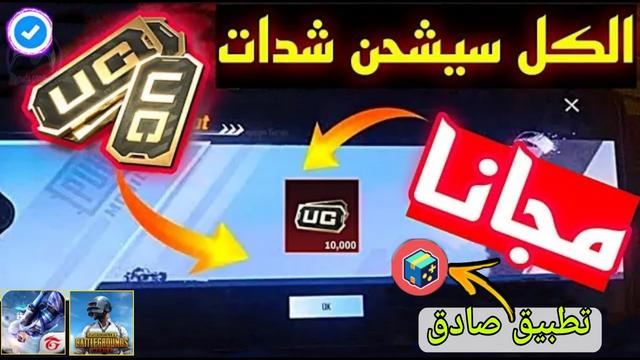The war in Syria: "This is the price we had to pay for freedom" "I don't blame the revolution for my losses"
Syrians left in March 2011 after the spark of the Arab Spring spread to their country, demanding freedom, democracy, and the overthrow of Bashar al-Assad's regime. However, this dream has turned into a nightmare of a war that has flared up and has not yet been extinguished, a refugee crisis fueled by millions of Syrians fleeing the war, and successive economic crises squeezing those who remain in the country.
Ten years after the Arab Spring stormed Syria, we monitor testimonies from Syrians who tell us what the Jasmine Revolution has blossomed into.
Ghiath Abu Ahmed - 30 years old - a freelance journalist
I used to love photography, so I picked up the camera observing the demonstration that started in front of my house in Darayya in 2011. I was recording from afar moments that I saw for the first time in my life.
We followed the movement in Tunisia and Egypt, but we never expected that we, too, would go out in large gatherings. I soon participated in coordinating the demonstrations, wishing that we would enjoy the freedom that the Tunisians and Egyptians achieved.
However, everything soon changed, and my town, Darayya, witnessed a massacre in August 2012, in which hundreds were killed. I lost many of my neighbors and friends in just two days, the hardest time I've been through in the past ten years. This was the dividing line, as I felt great fear and sadness, and did not dare to leave my town after that to participate in any demonstrations.
Darayya was subjected to a long siege that left me feeling bitter. I used to look over the horizon to see Damascus lit up with lights, while we live in complete darkness. People who enjoy freedom of movement and a comfortable life, while we find ourselves in destruction and siege.
I was completely lost when I was forcibly displaced from Daraya to Idlib in 2016, like fish without water.
All my plans in life were destroyed in an instant. But I never regretted it. If they chose me to take me back in time to 2011, I would have chosen the revolution and participated in it again despite what I lost. My parents were arrested and my brother was killed, but this is the price of freedom. I do not blame the revolution for my losses, but rather the criminality of the Syrian regime.
He who has been given freedom cannot return to slavery. Before the revolution, I was a young man who did not care about politics or change. I only aspired to finish my studies, get married, and work in commerce, but ten years of conflict made me another person who wanted to change the conditions of his society, and I became an influential person in those around me. I conveyed my thoughts to them in writing and photography.
It is true that the revolution has not yet won, but we have gained an area of freedom that was not there before. There was one voice that no one dared oppose, and it would have been impossible for me to work in journalism had it not been for the revolution."
"I don't tell my son anything about the war"
Nour al-Sham - 28 years old - a relief volunteer
I used to live with my family in the southern countryside of Idlib in a big house, and now we live in a tent .
In 2019, the regime launched its campaign against the southern countryside of Idlib, forcing us to flee from the bombing and flee to the camps of the northern countryside of Idlib.
I lost my cousin and my uncle's daughter in the bombing of their homes. My brother was arrested in 2012, and we don't know where he is yet.
We lacked nothing in our town but freedom. We fled our home and now live in primitive camps, which consist of a piece of land dotted with hundreds of tents and small prefabricated rooms.
In the winter, the camp turns into a swamp filled with water and mud. In the summer it is covered with thick dust and insects infested with it. The atmosphere of the camps is unfit for living and securing all life's necessities... a tragedy!
I live with my mother and two children in a small tent, and my husband had to leave us and go to Turkey to work there. I don't tell my son anything about the war, and I don't tell him what's going on around us so that he doesn't feel sad.
I was studying at the University of Aleppo, but I had to leave the university after several months of my activities in anti-government demonstrations due to security harassment.
I joined humanitarian work in 2014 with several charities and relief teams. I lost my chance for education. I dream of completing my studies, but it is almost impossible.
No one thinks about the future, and the concern of all of us in the camps is to search for a source of livelihood, just to survive.
"Every Syrian today suffers anywhere"
Fadi Mosli - 40 years old - - - - - - - - employee of the Red Cross
I live in Germany as a body without a soul. I look at the pictures of al-Sham, where I lived, and cry. I always yearn for my life in Syria, because alienation is what hurts me the most now. Sometimes I miss the stones and trees in Syria. I miss the street where I used to live, and my family and friends. My mother died and I couldn't even visit her grave.
At the end of 2012 I learned that I could not stay in Syria. I felt threatened all the time, especially after many of my friends in Damascus who participated in demonstrations calling for freedom and justice were arrested.
I had to leave for fear of my children, and if I stayed, I would have become just a number like Caesar's prisoners. Perhaps being in Germany will help me communicate the voice of the rest of the Syrians to the world. Here I was able to join a political party, and not to participate in the political process in a democratic climate that I hope our country will enjoy one day.
It saddens me to see images of the Syrian people and the systematic war machine of the Syrian regime killing them, and no one moved a finger to stop the scenes of killing all these years.
Attempts to derail the revolution and promote it as a sectarian war, crisis, or proxy war make me sad. I am saddened by the displacement of Syrians in camps and neighboring countries. Every Syrian today suffers wherever he lives and is stricken with nostalgia and longing for his country.
We went out to demand freedom, but the regime met us with bullets. We were dreaming of the dignity that we did not enjoy before the Syrian revolution.
I dream that the revolution will succeed and that love, freedom and democracy unite us, and that all components of the Syrian people agree on one political solution, and that everyone who has committed crimes against the Syrian people, whether from the regime or the opposition, will be held accountable.
"We are the ones who always pay the price"
Sara Rami - 40 years old - teacher
When the demonstrations started, I was so afraid that I stayed at home most of the time.
Simple people came out to demand freedoms, and their demonstrations were spontaneous, but their demands were not organized and they had no leader.
I saw banners bearing sectarian demands calling for division between us. I had hoped that the demonstrations would come from the cultural centers or from the university and not from the mosques, so that the demands would not have a religious character and would not be specific to a particular sect.
We live together in Damascus, and differences of religion do not separate us. I live next door to Christian and Muslim families, who are Sunni, Shiite and Alawite. Before the revolution, we never felt different. However, after this crisis, a question arose in my university: “To which sect do you belong and in which area do you live?” I lost a number of my friends because of him.

Rockets were being fired at us, and we don't know who fired them. My sister was killed in 2016 by one of these shells, fired from an area where there were armed men.
I do not blame the demonstrators among the simple people who went out to demand their rights, but there are those who profited from the movement and turned to arming, terrorism and religious extremism. There have become armed factions as many as our head hair, and strange names have spread to them. Every five people became a gang targeting people according to their identities. In the end, mistakes were made by the state and the demonstrators, in the presence of a third team that worked to bring them together.
People have been killed simply for being government employees. I don't know who was killing them. We used to hear about gangs and militants from dozens of factions and different directions every day. I was afraid for my mother's safety if she left the house because she is a state employee. A bus carrying my mother was targeted by snipers on its way from the Damascus countryside, after a work mission there.
The war years caused me to have a fear of any loud sound. I panic and tremble and my heart races if I hear the sound of thunder. I became obsessed with the fact that there would be an explosion at any moment, especially when I was in the taxi on my way home.
Ten years after this crisis, the security situation inside the cities has become better, but the economic situation is still bad. We hope that the new government will push America to lift the economic sanctions on Syria. It is the citizens who suffer under the brunt of the sanctions, not the officials.
We always pay the price. In war, everything is lost, the ugly and the beautiful.
"The Syrian revolution won because the people faced the regime"
Haroun al-Aswad - 33 years old - journalist
I was watching TV on June 24, 2012 and proudly following the victory of the Egyptians in their revolution when they announced The victory of Mohamed Morsi as president of the country. I went out of the house to demonstrate, full of enthusiasm for the Egyptian experience, but the security forces arrested me that day.
I suffered all kinds of physical and psychological torture in prison for a whole year. She was denied food, water, and access to the bathroom. I wished for death, but the hope that I would be released from prison gave me the strength to live.
One month after my release, the court summoned me again. I had no choice after that but to get out of Damascus or to surrender myself to the court with no guarantee that I would be released again.
I now live in Turkey after I was fed up with the corruption that befell the opposition, and after it became difficult for me to work in journalism from inside Syria. But I feel that I am still living in Syria due to my geographical proximity and constant communication with the people there.
The demonstrations started from mosques, but they were never an Islamic revolution or an Islamic movement. People gathered for Friday prayers gave them strength and made them feel their unity, and erased the fear that leaked in their souls. We have never called for any sectarian or religious demands. We were calling for freedom, social justice, and an end to the state of emergency.
I was displaced from my home nine years ago, and I am facing charges of terrorism and communicating with foreign parties as a punishment for my participation in the demonstrations, but I hope that one day I will return to my home.
I hope that truth will eventually prevail and that Bashar al-Assad and his government will be held accountable for their crimes against the Syrian people.
After ten years of the revolution, we can say that we have succeeded in breaking the barrier of silence and fear in Syria, after decades of oppression. We revealed the truth about the regime that committed unforgivable violations against us.
The Syrian revolution triumphed because the Syrian people faced the regime that governs them with an iron fist, but three other countries dominated the battlefields and caused the displacement of Syrians.
"I used to feel sad that my child would wake up and ask me for a sandwich, but I could not find anything to satisfy his hunger."
Safia - 45 years old - housewife
My husband and I and our four children fled Homs after a year From the beginning of the revolution, hoping to return when the regime stops its offensive. But we have not been stable or safe for the past nine years.
In 2018, we ventured from town to town towards northern Syria, away from the grip of the regime. Our convertible drives through the shells. Death is easier for us than arrest.
We were like inanimate objects, none of us said a word. No one could speak. Whenever we thought we were safe, the sound of new bombing brought us back to the ground.
I lived the most difficult days of my life during the five-year siege of Eastern Ghouta since 2013. We were not allowed medicine or any foodstuffs such as rice and flour. We found nothing to eat but cabbage leaves. It used to make me sad when my little boy wakes up at night and asks me for a sandwich, but I can't find anything to satisfy his hunger. There are many things I went through that I will not forget and I hope you will erase from my memory.
My husband and children were tortured by the Turkish security forces after we arrived at the crossing while we were trying to escape from Idlib two years ago.
They were tortured because the Turkish security men discovered that my husband and three of my children were working in journalism. I was shouting at the Turkish officer, "By what right do you do that! Leave them. What is their fault?" I don't know where you got that power from. Before that, I used to be terrified of anyone belonging to the security forces. I might have exploded because of all the injustice, insult and humiliation I saw.
The Turkish authorities contacted us after my husband talked about the incident. They apologized to us, confirmed that it was an individual act, and allowed us to enter Turkey. But we only stayed there for a few months before we moved to France.
I miss my family, brothers, and neighbors, but I no longer have hope of ever seeing any of them. The news comes to me of the death of one of them, so I have no hope of seeing who is left alive. My father passed away and I could never see him for the last time.
Despite my distance from my family and my country, I know very well that the revolution was an inevitable event. I am just one of the millions in Syria who have lost their homes and have been denied access to their loved ones. I am just like them.
The regime's spies were planted in all the streets and commercial places. People were afraid to speak even inside their homes. Everyone was silent for a long time until they exploded out against the corruption of the regime.
We've had enough.
"As if I were a leaf that fell on a land that does not accept it"
Younis al-Karim - 40 years old - economic analyst
Before the revolution, I was an economic advisor to prominent businessmen, and I had an economic studies office in Syria . But now I work in France with a profession that disturbs me psychologically, despite all my knowledge and my master's degree, I had to earn my daily living as a cleaner in a restaurant.
I was arrested for a few months in 2014 because of my attempt to establish a political party and plan economic policies for it. After I got out of prison, I felt that my life was in danger, so my family and I fled to Lebanon and from there to France.
I participated in the beginning of the demonstrations as a paramedic, and I always thought that taking to the streets in large numbers was not enough without an economic plan. The demonstrators had to put pressure on the government in other ways, such as withdrawing small currencies from the market and paralyzing the economy.
Facts about Syria
The return of the Islamic State organization to the towns of Syria
What achieved the dreams of the Syrians in the "Arab Spring"?
My wife has to cook and prepare meals, and she also holds a master's degree in economics. The saddest question someone would ask me:
"What are you doing?" what I say! I am an economist I was lecturing at the university? Or should I say that I work in the kitchen of a restaurant?
We have lost hope that we will live a better life or return to our country. Sometimes I wonder what am I doing here? As if I were a leaf that fell on a land that does not accept it. France does not welcome foreigners, so we encounter here racism, mistreatment and heartbreak that we have not felt before. I always feel like a stranger, even though it's been six years.
For example, my wife and I were walking down the street, and a Frenchman shouted at us, "Go back to your country," and called us terrorists. Nobody stepped in to protect us.
"I wish this crisis had not started."
Akram Raji - 27 years old - writer
I don't believe in a revolution that was sparked from without, the movement must come from within.
What happened in Syria ten years ago was an imitation of what was happening in other Arab countries. The demonstrations took a full sectarian direction. Some people sought freedoms and a secular civil state, but the demonstrations erupted from mosques and this was shameful.
There was no awareness among the people and no knowledge of how to move after that, which could lead to ruin.
People should distance themselves from religious ideology and not exclude the other side. There was a slogan raised in the demonstrations that I heard myself in Homs, saying, "The Alawites are on the coffin, and the Christians are on Beirut."
There were valid demands, but they were not put forward in an organized manner. For revolutions to succeed, they must happen from within, and there must be a greater understanding of the political process. The demonstrators had to demand constitutional reforms or the dismissal of officials.
United Nations: Tens of thousands of Syrians are missing
A German court convicts a former Syrian intelligence officer of crimes against humanity
I wish this crisis had not started ten years ago. The demonstrations did not meet my aspirations, were not organized, and did not demand a civil society that accommodates everyone.
If those who came out at the beginning of the crisis had not taken up arms and had not called out sectarian slogans, the issue would have been different. This is what led us after ten years to an economically dilapidated country.
The names of some of the interviewees have been changed to protect their identities.










